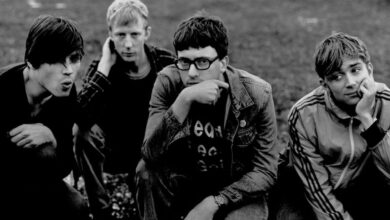‘God bless them for singing “Let’s go Eskimo” without question’: How Girls Aloud made Britain’s best 21st-century pop album

In November 2002, the British public voted a fivesome of aspiring singers into a pop group. It was not immediately obvious that they would go on to become the UK’s biggest-selling girlband of the 21st century. Formed on the ITV talent show Popstars: The Rivals, a boyband versus girlband spin on a format that had one year earlier birthed the speedily vanished Hear’Say, Girls Aloud immediately differentiated themselves from the sanguine radio pop of peers such as Atomic Kitten and Westlife.
Most significantly, Girls Aloud – comprised of Nadine Coyle, Cheryl Tweedy, Nicola Roberts, Kimberley Walsh and Sarah Harding – were cool. Their debut single “Sound of the Underground”, with its surf guitar and jittery drum-and-bass lines, sounded like nothing else at the time of its release. Their sound as a band would be polished and pop, but with an edge that always veered into the utterly bizarre.
It wasn’t, however, a smooth ride. “Sound of the Underground” rode a wave of ITV hype to top the charts for four weeks, but sales of their debut album of the same name had underwhelmed their label Polydor. A second album – and there was no guarantee they’d even get one – would need to alleviate fears about the band’s longevity, their musical identity and the ambiguity of the five women in the group.
As the band prepare to embark upon a sold-out reunion tour of arenas across the UK and Ireland – which also serves as a celebration of Harding, who died from cancer in 2021 – we sat down with many of the players involved in the making of what would become 2004’s What Will the Neighbours Say?
Just released for the first time on vinyl, the album housed smashes including “The Show” and “Love Machine” – pop oddities honed by the maestros at production house Xenomania, which at first confused Girls Aloud themselves but came to define who they are as artists and figures of Noughties Britannia.
In the autumn of 2003, the future was unclear for Girls Aloud. Despite massive investment from Polydor and ITV, sales of the group’s debut album were lower than anticipated, their last hope being a cover of The Pointer Sisters’s “Jump” for the soundtrack to romcom ‘Love Actually’.
Colin Barlow, head of A&R at Polydor: It felt like the audience wasn’t quite sure what they were.
Peter Loraine, head of marketing at Polydor: In those days a lot of the artists signed to the label were selling a million albums [and] the Girls Aloud album [sold] only around 300,000. The concern from higher up was, you’ve had this opportunity – how can you make it grow rather than decline?
Nicola Roberts: I remember just before “Jump” getting a call and it was suggested, quite blasély, that the label might not be picking up the option for the second album. [I thought] Oh my god, this literally could all be over…
Nadine Coyle: I was being so dramatic, and my mom was like, “Well – you didn’t have an album deal last year and you were fine?” So I calmed down a bit and thought, even if [a second album] doesn’t happen, it was a great run. We had a number one for four weeks with “Sound of the Underground”!
Poppy Stanton, marketing manager at Polydor: Peter and I had to fight quite hard for the girls.
Barlow: What was a massive change was when we did “Jump” for Love Actually, and it became huge. I think that really solidified Girls Aloud.
Loraine: The first album was this hodgepodge of songs. I would put my neck on the line and say probably only 50 per cent are good enough.
Barlow: What we’d learnt from the first album was that Xenomania should do everything.
Brian Higgins, producer at Xenomania: Colin Barlow phoned me and said: “You’ve got to make this whole album for it to work”. It was a shock to me because we were used to competing with producers from Sweden left, right and centre. He said that if we didn’t agree now to make the whole album, he couldn’t guarantee the outcome.
Kitsch: The cover art for the band’s single ‘Love Machine’
Barlow: I sat with Brian and Miranda and said “You are Girls Aloud. No one else is going to write with the girls.” We all very much felt like they were part of the group.
Miranda Cooper, songwriter at Xenomania: It was absolutely not a given that the girls would be making this record, and so that very much bonded us with them.
With the production team in place and the second album officially greenlit, Polydor execs set about deciding how the group would be reintroduced to the public – and how they could be established as bona fide pop superstars.
Stanton: The feedback was that people didn’t really know who they were. Some still didn’t know the girls’s names, and felt like they were perhaps a bit serious.
‘Our brief was to make the girls household names’: An early promotional billboard for the group
‘You’re kind of the public’s property’: The group at a press event in 2003





